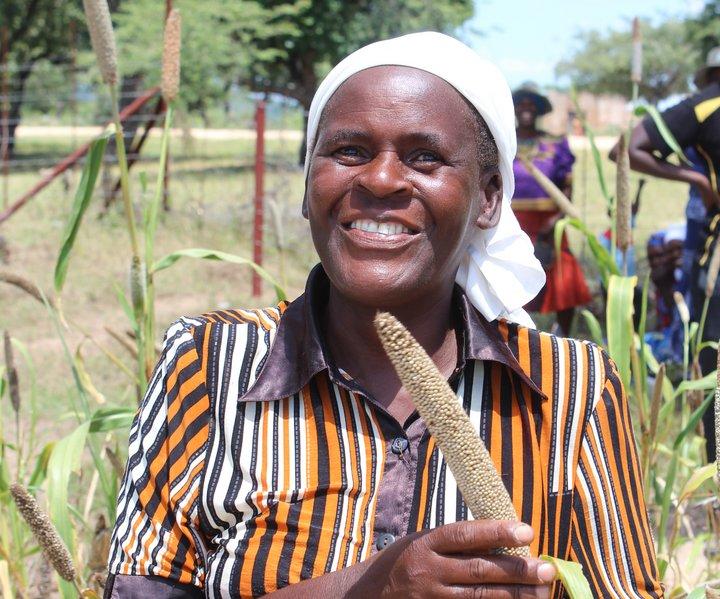A Resilient Seed Systems Handbook to support farmers adapt to climate change

Developed by a multidisciplinary team of Bioversity International researchers and research partners, the Resilient Seed Systems Handbook Second Edition is a tool to enhance the access and use of crop diversity to adapt to climate change.
When we meet and work with farmers from all over the world, they all give us the same message: having better access to crop and varietal diversity helps them to adapt to climate change. When supportive policy and socioeconomic conditions exist, a diversity of seed production and distribution practices makes up a resilient seed system. Such strengthened adaptive capacity can contribute to greater food availability throughout the year, with more nutritious and healthy crops, income generation and a sustainable resource base.
All this sounds very theoretical, but what happens in practice? How can countries design and implement a comprehensive capacity-building strategy to access and use crop diversity more effectively to adapt to climate change? That is where the Resilient Seed Systems Handbook, developed by a multidisciplinary team of Bioversity International researchers and research partners, comes into play.

The Handbook includes nine modules that represent the steps of a dynamic research cycle:
- Situational analysis and planning
- Data preparation and selection of software
- Climate change analysis and identification of germplasm
- Germplasm acquisition
- Field experimentation
- Seed production and distribution
- Germplasm conservation
- Participatory evaluation
- Knowledge sharing and communication.
Based on the experience and use of the first edition, developed in 2016, this second edition expands on some topics, incorporates refreshed examples of good practices, updated references and introduces a new module on seed production and distribution which looks at ways in which organized smallholder farmers can produce and market seed, locally and beyond their own communities.
Bioversity International, in collaboration with research partners in Africa, Asia and Latin America, has been further developing the resilient seed systems approach and methodology presented in the first edition of the Handbook. In Burkina Faso, researchers from the Université de Ouagadagou applied knowledge from the first edition to acquire new millet accessions that are better adapted to the changing climate. In Bhutan, plant breeders and staff of the National Biodiversity Centre completed climate change scenario analyses using DIVA-GIS and the climate analogue tool for five important agroecological sites for the major crops (rice, maize, potato and chili) taking 2030 as reference year. In Rwanda and Uganda, a team of scientists and extension agents used climate change scenario analysis to identify present and future analogue sites. Using DIVA-GIS and crop suitability modelling applied to beans the team then identified bean accessions with good climate adaptation potential and tested a sub-set in the field. The Wageningen Center for Development Innovation and Bioversity International are using several of the modules in the annual short training courses for professionals on conservation and sustainable use of plant genetic resources and resilient seed systems.
The Handbook is intended for plant breeders, researchers, genebank managers and policymakers with an interest in plant genetic resources; for university lecturers and advanced students with an interest in agricultural development, adaptation to climate change and seed systems; and for others involved in strengthening farmers’ seed systems and their capacity to adapt to climate change.
This tool can be used in multiple ways – as a one-stop shop for finding selected resources to be consulted on an ad hoc basis, as a learning tool for building capacity in facilitating, conducting and/or participating in such a research process, or as educational material for higher education classes or on-the-job training workshops.
We look forward to receiving feedback on the content and practical use of the Handbook.
Contributors to the Resilient Seed Systems Handbook Second Edition are: Guy Bessette, Jeske van de Gevel, Joseph Kidane, Michael Halewood, Isabel Lopez-Noriega, Sarika Mittra, Andrew Mushita, Gloria Otieno, Per Rudebjer, Jonathan Steinke, Jacob van Etten, Maarten van Zonneveld and Ronnie Vernooy.
The second edition of the Handbook has been made possible thanks to the financial support of the Ministry of Agriculture, Food Quality and Nature of the Kingdom of the Netherlands under the collaborative agreement on ‘Resilient Seed Systems for Climate Change Adaptation and Livelihood Security’. In addition, financial and technical support was provided from CGIAR Research Program on Climate Change, Agriculture and Food Security (CCAFS), which is carried out with support from the CGIAR Trust Fund and through bilateral funding agreements. For details, please visit https://ccafs.cgiar.org/donors
